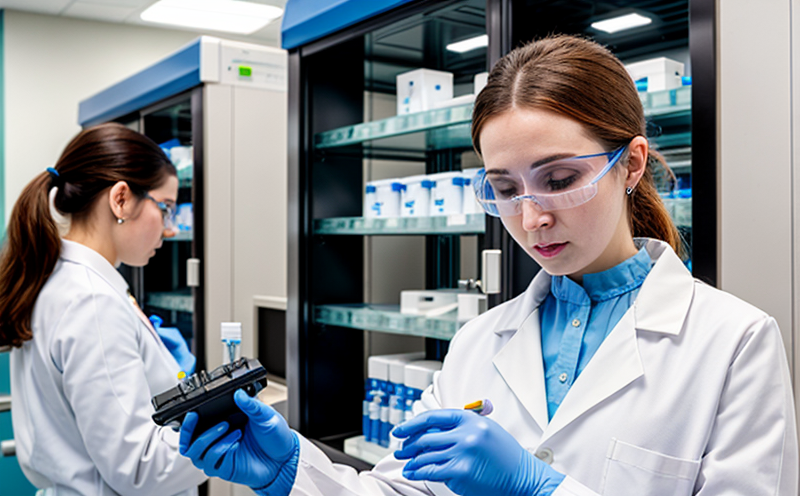Small Molecule Bioanalysis Testing
In the pharmaceutical sector, small molecule bioanalysis testing plays a pivotal role in ensuring product safety and efficacy. This service involves the detailed analysis of small molecules within biological systems to understand their behavior, metabolism, and pharmacokinetics. Small molecule bioanalysis is critical for drug development, from early discovery through clinical trials and post-market surveillance.
The process typically begins with sample preparation, which may involve extraction techniques such as liquid-liquid partitioning or solid-phase extraction. The extracted compounds are then analyzed using high-resolution mass spectrometry (HRMS) and chromatography methods like liquid chromatography-tandem mass spectrometry (LC-MS/MS). These advanced analytical tools allow for precise quantitation of small molecules in biological matrices such as plasma, urine, or cell cultures.
One of the key aspects of this testing is the evaluation of drug metabolism. Understanding how a drug is metabolized can provide insights into potential side effects and interactions with other drugs. This is achieved by monitoring the parent compound and its metabolites in biological samples. The data generated from these analyses are used to support regulatory submissions, such as New Drug Applications (NDAs) or Biologics License Applications (BLAs).
The acceptance criteria for small molecule bioanalysis testing are stringent and vary depending on the specific drug being evaluated and its intended use. Compliance with international standards like ISO 17025 is essential to ensure laboratory quality and reliability. The analytical methods used must be validated according to guidelines such as ICH Q2 (R1) and Q3D(R1).
Our team of experts specializes in providing comprehensive bioanalytical services for small molecules, ensuring that clients receive accurate and reliable data. This expertise is crucial in navigating the complexities of drug development and regulatory compliance.
Applied Standards
The application of rigorous standards ensures the highest level of accuracy and reliability in small molecule bioanalysis testing. International standards such as ISO 17025 provide a framework for laboratory quality management, while ICH Q2 (R1) and Q3D(R1) specifically guide the validation processes required for bioanalytical methods.
ICH Q2 (R1) focuses on analytical method development, validation, and qualification. It outlines the requirements for ensuring that the analytical methods used in pharmaceutical testing are robust and reproducible. Compliance with ICH Q3D(R1) ensures that the analytical methods do not interfere with the detection of impurities or degradants present at levels relevant to drug quality.
Our laboratory adheres strictly to these standards, ensuring that all bioanalytical tests are conducted in a manner that meets regulatory requirements. This commitment to excellence helps pharmaceutical companies meet their obligations and ensures patient safety throughout the product lifecycle.
Scope and Methodology
| Method | Description | Application |
|---|---|---|
| Liquid Chromatography-Tandem Mass Spectrometry (LC-MS/MS) | An advanced technique for the separation and quantification of small molecules in complex biological matrices. | Quantitation of drug concentrations, metabolite identification. |
| Gas Chromatography-Mass Spectrometry (GC-MS) | Used for the analysis of volatile compounds and low-molecular-weight substances. | Detection of impurities in drug products. |
| Ultra Performance Liquid Chromatography (UPLC) | An enhanced version of LC that offers faster separations and better resolution. | Enhanced analysis of complex mixtures. |
Use Cases and Application Examples
The application of small molecule bioanalysis testing extends across various stages of pharmaceutical development. In early-stage drug discovery, this service helps identify potential lead compounds by profiling their metabolic pathways. During clinical trials, it plays a crucial role in assessing the pharmacokinetics and safety profile of investigational drugs.
One common use case is the monitoring of drug-drug interactions (DDIs). By analyzing how different drugs affect each other's metabolism, we can predict potential adverse effects and optimize dosing regimens. Another important application is in post-market surveillance, where ongoing bioanalytical testing ensures that marketed products continue to meet safety and efficacy standards.
Our team has successfully supported numerous clients across the pharmaceutical industry with their small molecule bioanalysis needs. We have conducted tests for compounds ranging from simple organic molecules to complex drug conjugates, ensuring comprehensive coverage of all relevant analytical techniques.





